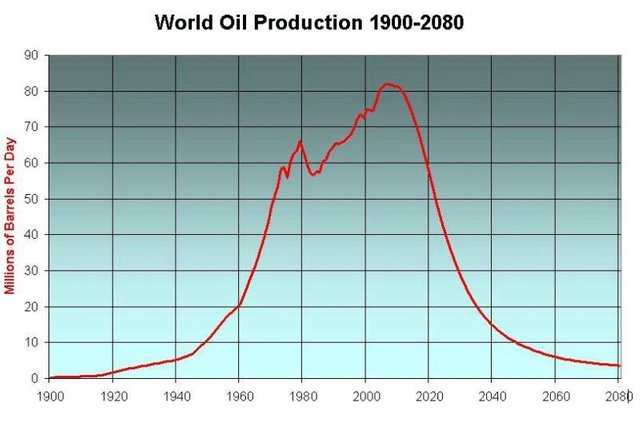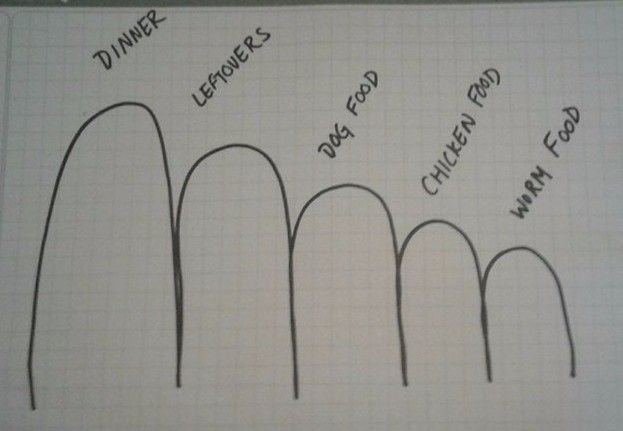Permaculture Principle #2: Catch and Store Energy
The Second Permaculture Design Principle is Catch and Store Energy.
While I am tempted to say that this is possibly my favourite principle, I actually could say that about quite a few of them.
Catching and storing energy is what permaculture, homesteading, and good design is all about. We live in a world where energy was considered cheap and abundant, and often never give thought to where and how it is actually being produced. Most of us understand the ecological, political, and social issues that surround the oil industry. If that is not enough to convince you to look elsewhere for your energy, then maybe the idea of peak oil will.

Post Edit: Thanks to astute Steemer @bobydimitrov , the above graph may not be the full picture of our oil production. He provided another link which I include here:
https://www.iea.org/publications/freepublications/publication/key-world-energy-statistics.html
Thanks @bobydimitrov !
As you can see by this simplr graph or the more thorough statistics, we are on the downtrend for available oil reserves. As oil gets harder and harder to extract, we tend to create more wars and more ecological destruction, just to maintain the same lifestyle we grew accustomed to when oil was literally pouring right out of the group.
Permaculture invites us to leave that old story behind and capture our own sources of renewable energy right in our own backyard.

This is one example. This is a super efficient rocket stove that one of our natural building courses built for a local family here in guatemala. It uses very little fire wood and produces loads of heat for cooking food and heating water. We also use a similar stove on our farm to process our chickens, make yogurt/cheese, and to cook our meals. By using firewood that we produce sustainably on our farm, we are removed from having to use natural gas to cook our food. The practice of planting trees and harvesting firewood is a perfect example of Capturing and Storing Energy.
We could also talk about water use. Can I use the dirty dish water to irrigate the garden? Can I catch the water that I wash my hands with to flush the toilet? Or better yet, can I catch and store my humanure and turn it into compost, and leave clean water out completely?
Here is one more that has t do with food waste:

How can i catch and store the energy of my dinner? Leftovers is one easy way. And then feed the animals. And then feed the soil.
This idea of the basketball bounce going down a bit each time is a great way to think of energy storage. As it hits each peak, the next bounce is a bit less quality energy, but still useful for something. We can adjust how we use our energy t match the quality of energy with the needs of the task.
This also goes for our personal energy. I feel that I need 100% energy to write emails and write posts on steem. That is the top bounce. Then I can poke around on news sites or do some lite gardening. That is the second bounce. My energy is diluted by then, but still enough to do less demanding tasks. If i just did gardening in the morning, i may never answer emails.
All this can also be said as cycling energy through a site. The site can be your farm or even your house or your body. How can we get energy to last as long as possible and be applied to as many different jobs as possible before it finally dissipates?
How do you guys catch and store your energy?
And as always, this list of 12 Permaculture Principles was given to us by the great David Holmgren, co-founder of Permaculture. Very grateful!
https://permacultureprinciples.com/
NOTE: Photo #2 is used under the Fair Use Act.
All the rest of the post is completely original content.
The world oil production chart is rather misleading, to say at least. It's factually incorrect. Here's a recent data set:
https://www.iea.org/publications/freepublications/publication/key-world-energy-statistics.html
Thanks for the note. I will update the post. Although the link you provided has no graphics. Any other lead to a more accurate representation of how screwed or energy supplies are?
@bobydimitrov the post is updated and includes your link. Much appreciated. Aside from the one factual mistake, curious to hear what you think of the post. Cheers for now. Shad
Heya Shad, I've watched all your videos and much appreciate your work in Guatemala. Respect! I found out about Atitlan Organics via a discussion during an Oregon University introduction to permaculture course!
I wholeheartedly agree with the general statement of the post, as well as the 12 principles. Regarding our energy "supplies"... much can be said, not all of it grim!
You probably know better than me the "flow" of the energy we get from the sun and some systems on Earth, like hydrology, is plenty and more than enough if harnessed properly and used as much as possible. Currently we suck massively at that - less then 2% of world's energy needs come from solar/wind/geothermal! We're currently living on a "stock" of energy that is limited and is being depleted.
IMHO, a transition is possible and I'm still hoping we'll have the time and providence to slide along the "Green Tech" curve. I take it you're acquainted with the 4 scenarios of Holmgren?
I'm just not the alarmist type. I try to do my best to help people transition to a more sustainable lifestyle and those of us in a position to do so - a transition to a regenerative actions.
If you download the PDF at the address I posted above, you'll see that the world crude oil production has not peaked yet. There are plenty of informative graphs in there, but they do not push the alarmist agenda, so they're not quite as popular.
There's not a stable trend of declining production. The main problem is not the production, as the original chart implies, but increasing consumption while the production is not increasing at the same rate.
In other words, we've got more than plenty crude oil in the ground. I think in time it'll just become too expensive for general consumption (i.e. - transportation; currently over 60% of all crude oil is used as fuel). At that time transport will probably be mostly electric. But for industrial production and use, there's decades and decades of resource. Probably even centuries, if we're looking at just the current goods manufacturing.
And we need that, because all those modern "sustainable" solutions like PV panels and turbines, even a ram pump need industrial system in place to produce the components. Barring a "Earth Steward" scenario, I think it's likely we'll be in transition for a good portion of the century.
So while I encourage people to live a life that's less destructive to the planet, I'm not the one to shout "the sky is falling!"
Then again, if we're talking a total collapse, as in the "Earth Steward" scenario, crude oil production rate won't be of much importance. So if you're hoping for such an outcome, posting a graph like that does not really help.
Sorry for the lengthy reply, it came out a bit like a post of its own! Cheers!
Your post has been discovered by @livesustainably I manage the #livesustainably tag.
@Livesustainably promotes and curates content that encourages and educates others in living sustainably.
At this time, as it is a new tag I am looking in in other channels. In the future you should post with the livesustainably tag so that you can get upvotes and curation from me. To find out more see my introductory post.
Awesome. I just found you in my feed like ten minutes ago! Love your idea. Following and hope to connect more!!
Congratulations, Your Post Has Been Added To The Steemit Worldmap!
Author link: http://steemitworldmap.com?author=squdsi1
Post link: http://steemitworldmap.com?post=permaculture-principle-2-catch-and-store-energy
Want to have your post on the map too?
Add the following inside your post:
!steemitworldmap xxx lat yyy long description d3scr
(replace xxx and yyy with latitude and longitude)
love the food waste graph - that's one of the things that has made a HUGE difference in our lives. re-purposing leftovers. eating as much as we can. then giving it back to the earth in exchange for more food.
the same can slightly be said for water. like, if you make boiled eggs. save the water after cooling for plant watering. or, make a compost tea with it if you're in the rainy season. don't just immediately put it back down the drain!
Super smart. Reuse cooking water!!! We also rinse all our dairy utensils after milking the goats into a pot that goes to our chickens for some extra probiotics and protein.
@jonpetrich - this is a smart idea for goats and chickens!
How would you apply this particular principle to investing in crypto ? @hami